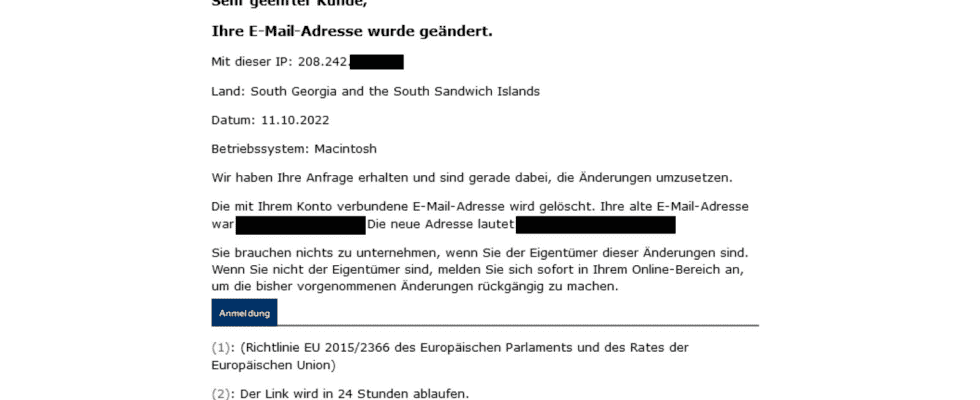Postbank customers are currently being targeted by an unusual phishing scam. Criminals want to mislead you by changing your email address.
Cyber criminals want to unsettle you with this Postbank phishing email. (Source: consumer center)
- Criminals want to get your Postbank data with a phishing email.
- The pretext is the supposed change of your e-mail address.
- Don’t let the message unsettle you and delete it.
In phishing emails, cybercriminals keep coming up with new pretexts to get at your data. This is also the case in a current message that is aimed at your Postbank data. The criminals claim that the email address associated with your account has been changed.
You will be informed in the e-mail that you should register immediately in the Postbank online area if this change was not made by you (which of course is the case). In order to unsettle you and put you under pressure, it is stated that the address change took place abroad. In addition, you supposedly only have 24 hours to undo the change.
An attached link takes you to the supposed online area of Postbank. But in reality it leads to a fake page. As the consumer advice center reports, all sensitive data that you enter there falls into the hands of the scammers. We advise you to ignore the mail and not let it unsettle you.
Simple signs: This is how you recognize every phishing email
A first indication that you have received a phishing email: the email will ask you to confirm personal data or to enter it on a website. This Under no circumstances should you comply with the request. In addition, criminals often use the official logos of the companies they are copying in their emails, but not official sender addresses.
If you find the sender suspicious, you should read the email twice. You will often find spelling mistakes or inconsistencies in German grammar. The attackers usually do not write their emails themselves, but instead use automatically generated messages or translate known emails with a translation program. But why all the effort?
What do criminals achieve with phishing attacks?
Phishing is used on the Internet to collect real user data. Money can be made with these if e-mail addresses, names and other information are sold for advertising purposes or passed on in criminal forums. With the data obtained, cyber criminals can also address future phishing attacks in a more targeted manner, making their attacks more effective.
Did you receive a suspicious email?
Forward them to [email protected]
or follow us on:
Phishing Checklist
- ✔
Spelling mistake? - ✔
Sensitive data requested? - ✔
Official logos? - ✔
Unknown sender?
Attachments and links contained in malicious e-mails also often inject malware or viruses onto your computer. In addition, you should not simply ignore suspicious emails. Forward them to the above email address and help us report future phishing attacks.
More fraud alerts on netzwelt – stay one step ahead of cybercriminals
But phishing emails are not the only danger lurking on the internet. In addition to fraud attempts, there are all kinds of viruses, Trojans and malware that can infect your computer. Unfortunately, data scandals are also part of everyday digital life. You can see the five most recent articles on the subject of “Scam Alerts” below:
Do you want to stay informed about the latest fraud reports, Subscribe to netzwelt on Twitter, Facebook and Instagram. You can also find all articles on the subject on the next page.
Don’t miss anything with the NETWORK-Newsletter
Every Friday: The most informative and entertaining summary from the world of technology!
